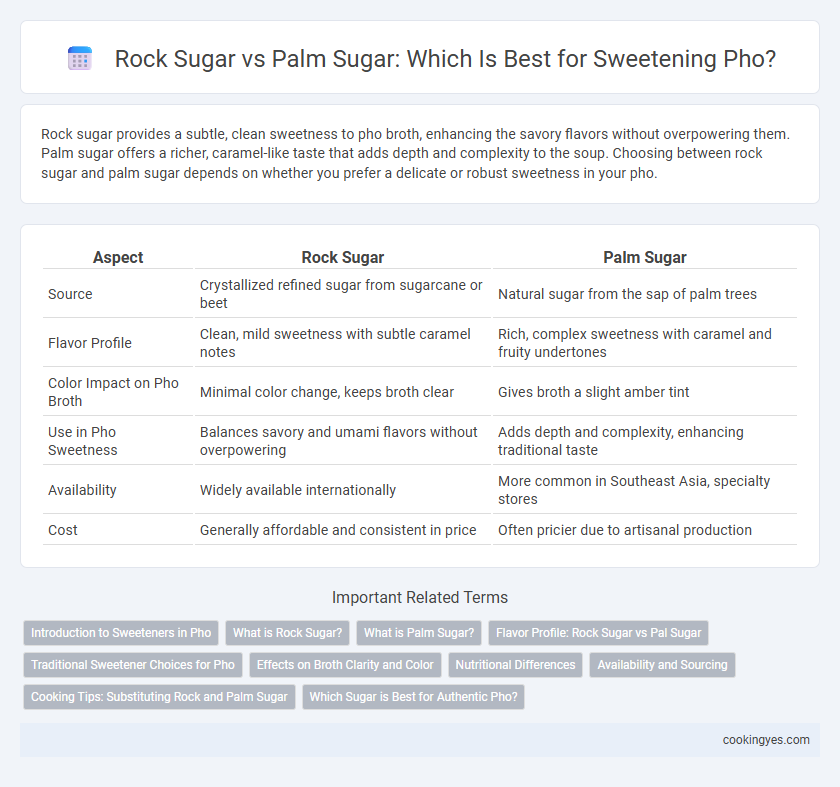Rock sugar provides a subtle, clean sweetness to pho broth, enhancing the savory flavors without overpowering them. Palm sugar offers a richer, caramel-like taste that adds depth and complexity to the soup. Choosing between rock sugar and palm sugar depends on whether you prefer a delicate or robust sweetness in your pho.
Table of Comparison
| Aspect | Rock Sugar | Palm Sugar |
|---|---|---|
| Source | Crystallized refined sugar from sugarcane or beet | Natural sugar from the sap of palm trees |
| Flavor Profile | Clean, mild sweetness with subtle caramel notes | Rich, complex sweetness with caramel and fruity undertones |
| Color Impact on Pho Broth | Minimal color change, keeps broth clear | Gives broth a slight amber tint |
| Use in Pho Sweetness | Balances savory and umami flavors without overpowering | Adds depth and complexity, enhancing traditional taste |
| Availability | Widely available internationally | More common in Southeast Asia, specialty stores |
| Cost | Generally affordable and consistent in price | Often pricier due to artisanal production |
Introduction to Sweeteners in Pho
Rock sugar and palm sugar both serve as traditional sweeteners in pho, each imparting distinct flavor profiles. Rock sugar offers a subtle, clean sweetness that enhances the broth's depth without overpowering other ingredients, while palm sugar introduces a rich, caramel-like complexity with hints of molasses. Choosing between these sweeteners can influence the overall balance and authenticity of the pho experience.
What is Rock Sugar?
Rock sugar, also known as rock candy, is crystallized sugar made by allowing a supersaturated sugar solution to slowly crystallize onto a surface. In pho broth, rock sugar provides a pure, subtle sweetness that enhances the savory flavors without overpowering the delicate balance. Compared to palm sugar, rock sugar dissolves more evenly and imparts a cleaner, less caramelized taste, making it a preferred choice for authentic pho recipes.
What is Palm Sugar?
Palm sugar, derived from the sap of various palm trees such as the sugar palm or coconut palm, is a traditional natural sweetener commonly used in Southeast Asian cuisine. It contains minerals like potassium, magnesium, and zinc, offering a richer, caramel-like flavor compared to rock sugar. In pho broth, palm sugar enhances sweetness with subtle earthy undertones, balancing the savory and aromatic spices more complexly than the straightforward sweetness of rock sugar.
Flavor Profile: Rock Sugar vs Pal Sugar
Rock sugar imparts a subtle, clean sweetness with a slight crystalline texture that enhances pho broth without overpowering other flavors. Palm sugar offers a richer, caramel-like taste with earthy undertones, providing depth and complexity to the pho's savory profile. Choosing between rock sugar and palm sugar depends on whether a more delicate or robust sweetness is desired to balance the broth's aromatic herbs and spices.
Traditional Sweetener Choices for Pho
Traditional pho recipes often feature rock sugar or palm sugar as their preferred sweeteners, each imparting distinct flavor profiles to the broth. Rock sugar offers a subtle, clean sweetness that enhances the savory depth without overpowering, making it ideal for balancing the rich beef or chicken flavors. Palm sugar contributes a complex, caramel-like sweetness with mild earthy undertones, adding authentic Southeast Asian character to the pho's taste.
Effects on Broth Clarity and Color
Rock sugar enhances pho broth clarity and maintains a lighter color by dissolving evenly without adding impurities, resulting in a clean, translucent appearance. Palm sugar imparts a richer, caramelized hue to the broth, slightly darkening it and creating a deeper color profile due to its natural molasses content. Choosing between rock sugar and palm sugar directly affects the visual appeal and perceived purity of the pho broth.
Nutritional Differences
Rock sugar and palm sugar differ significantly in their nutritional profiles when used to sweeten pho. Rock sugar primarily consists of pure sucrose with no vitamins or minerals, providing a quick source of energy without added nutrients. Palm sugar contains trace amounts of vitamins and minerals such as potassium, magnesium, and iron, and has a lower glycemic index, making it a slightly healthier option for maintaining balanced blood sugar levels in pho preparation.
Availability and Sourcing
Rock sugar is commonly used in pho for its mild sweetness and easy availability in most grocery stores worldwide, especially in Asian markets. Palm sugar, sourced from the sap of palm trees, often comes in specialty or ethnic stores and may be less accessible due to regional production constraints, primarily in Southeast Asia. The choice between rock sugar and palm sugar for pho sweetness often depends on local availability and the specific flavor profile desired in the broth.
Cooking Tips: Substituting Rock and Palm Sugar
Rock sugar and palm sugar both enhance pho's sweetness but differ in flavor profiles; rock sugar offers a mild, clean sweetness, while palm sugar provides a richer, caramel-like note. When substituting, use equal amounts to maintain balance, but adjust for palm sugar's stronger flavor by slightly reducing the quantity. Dissolve rock sugar directly into the broth for a clearer finish, whereas palm sugar may need gentle melting to blend smoothly without altering the soup's clarity.
Which Sugar is Best for Authentic Pho?
Rock sugar and palm sugar are both used to add sweetness to pho, but rock sugar is preferred for achieving a cleaner, more balanced flavor without overpowering the broth. Palm sugar imparts a subtle caramel and fruity sweetness, which can introduce complexity but may shift the traditional taste profile. For authentic pho, rock sugar is generally considered the best choice as it dissolves easily and enhances the broth's natural umami without masking other key ingredients.
Rock sugar vs palm sugar for pho sweetness Infographic

 cookingyes.com
cookingyes.com